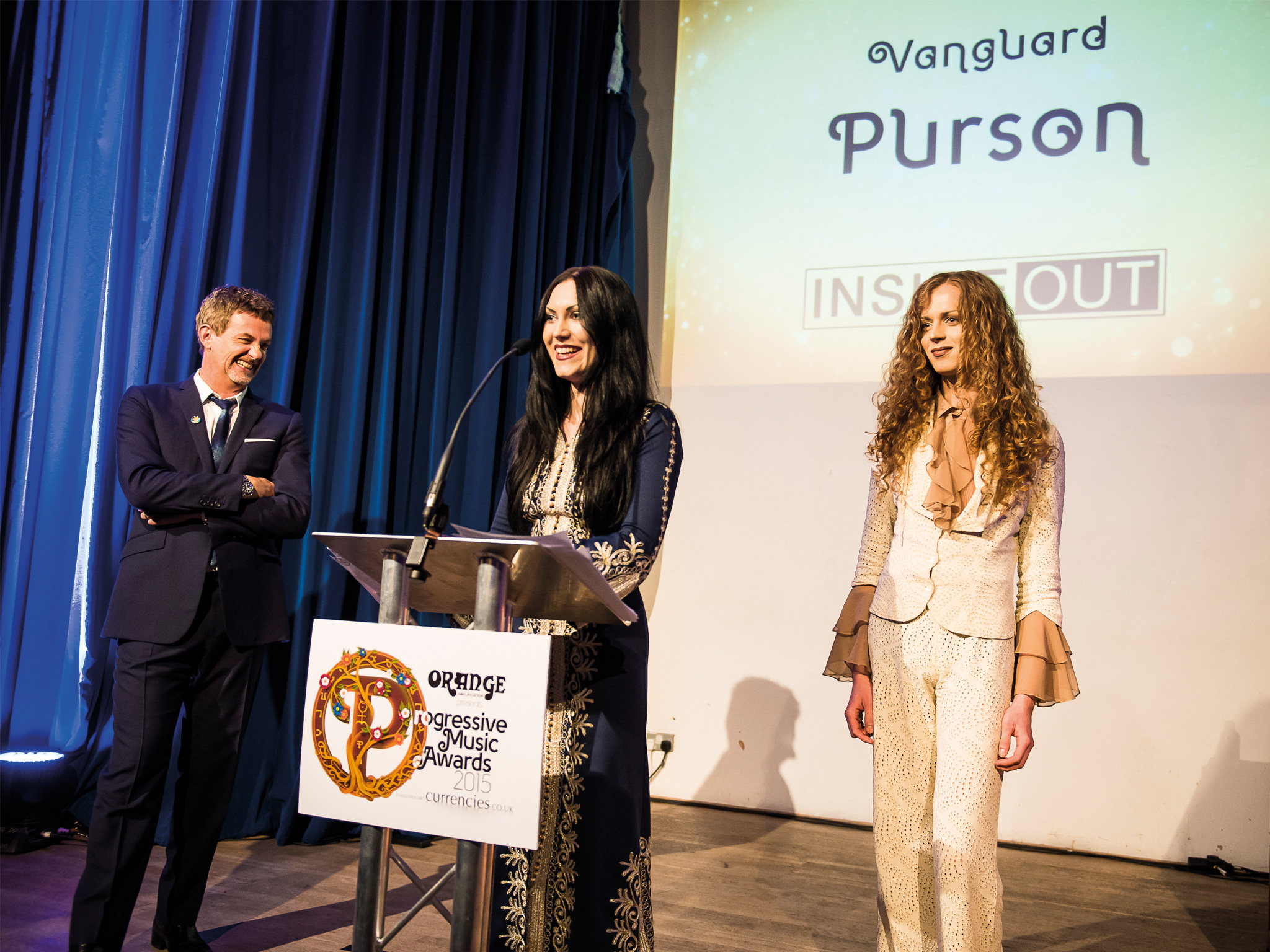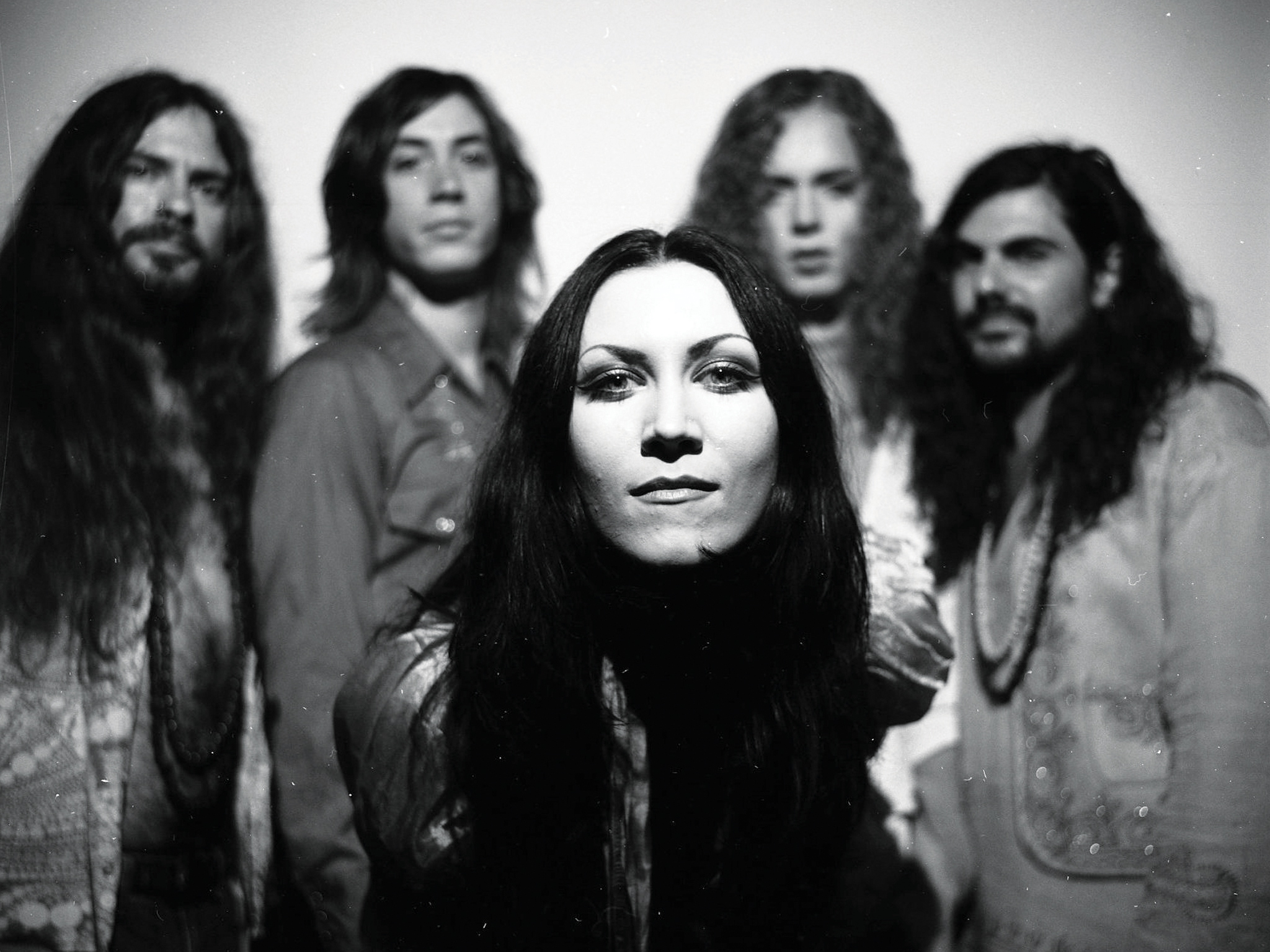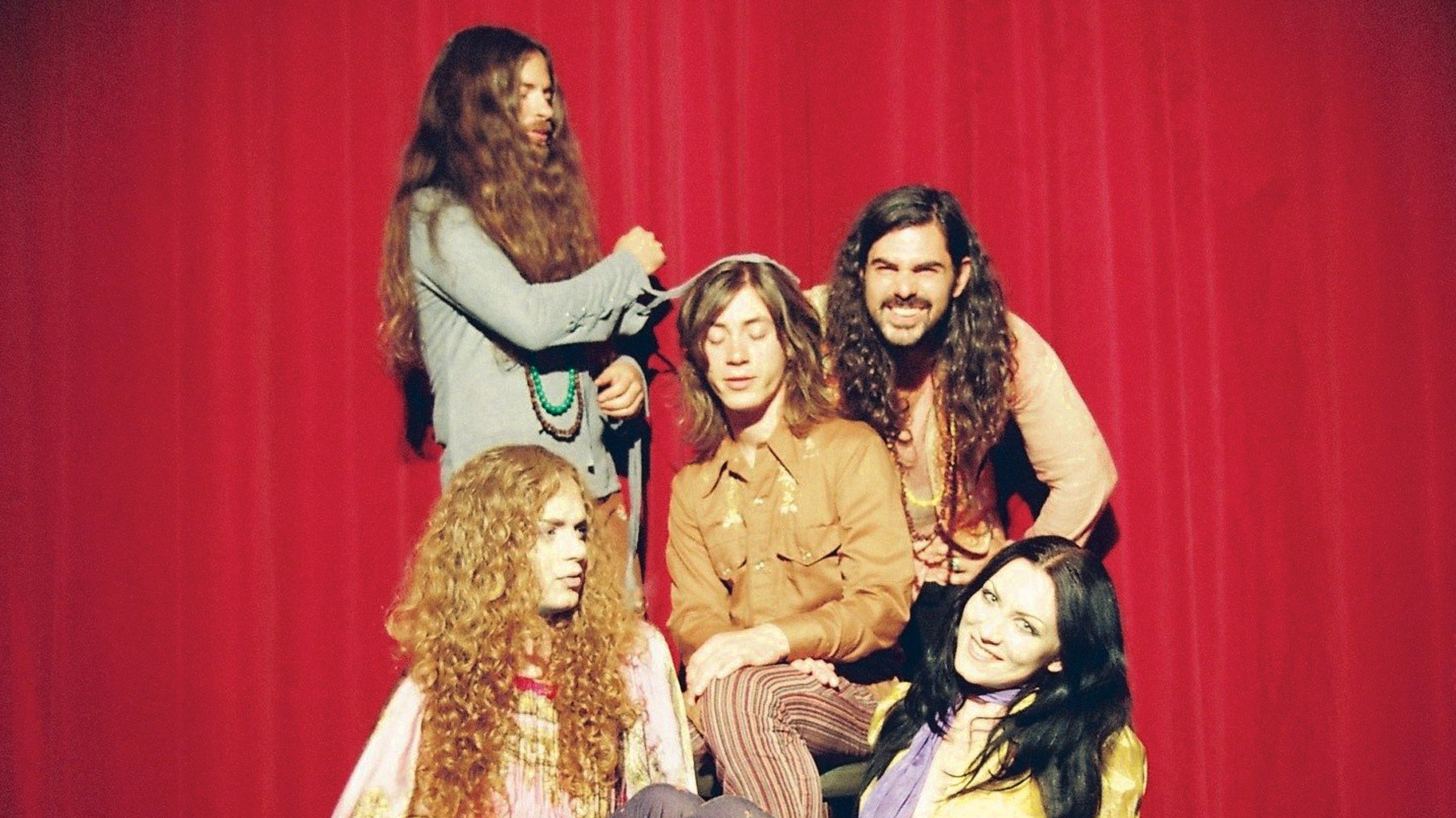Rosalie Cunningham has always felt like she was born out of time.
“It’s the bane of my life,” explains the 25-year-old. “I find it so frustrating and am sickened by the whole internet age, which I really find quite grotesque. I wish we could go back to how things were, when it was just about music. Ideally I’d have liked to be the age I am now in 1971, because I would’ve been able to have had a music career in the late 60s, then carried on well into the 70s before I’d even got to the age of 30.”
It’s a piece of wishful thinking that finds physical expression in Purson, the London-based band she’s led since their formation in 2011. As songwriter, singer and guitarist, Cunningham has fashioned music very much in the image of her favourite epoch, from the psychedelic splashes of The Beatles to the heavy classicism of Black Sabbath and on through the starry glam rock of David Bowie.
Perhaps the most cogent example of Cunningham’s wistfulness is Tragic Catastrophe, a standout from Purson’s 2013 debut The Circle & The Blue Door. The song maps out its protagonist’s dream of being a rock star in an age that doesn’t quite fit, directly echoing the time Cunningham chanced upon her dad’s collection of 70s music weeklies. ‘In a dusty attic he found a magazine,’ she sings, her voice luminous with the sensual thrill of discovery. ‘Full of gods and heroes, of deities and queens/He took it as his bible, with religion in his eyes/He saw his life before him, he saw his name in lights.’
I wish we could go back to how things were, when it was just about music. Ideally I’d have liked to be the age I am now in 1971.
Yet Purson’s peculiar allure runs far deeper than simple nostalgia for a bygone age. Cunningham and her band draw from a vast swathe of prog, folk, acid rock and electric blues to create music that bursts forth in fresh and unexpected directions, each new trajectory busily feeding off those around it. Allied to her fine-tuned gift for a melody and richly forcible tones, it’s the kind of music that speaks to a meta-modern era where anything and everything is ripe for picking.
Purson are emphatically prog, in the very real sense of the word. Not for nothing did this magazine bestow on them the Vanguard Award at last year’s Prog bash. “That was a massive deal for me personally,” says Cunningham. “It’s been a tainted word in the past, but calling our music progressive is the biggest compliment that anybody could give me. Prog takes you on a journey, it takes you somewhere else. It can paint a picture and be a lot more poetic than the standard rock or pop structure.
“The first prog bands that I really got into were King Crimson and Genesis, and once I’d exhausted their back catalogue I realised there was a never‑ending world of 70s prog out there. I went down the Canterbury scene – Caravan, Soft Machine and the rest – and Bowie as well. I consider him quite prog, especially his second album [1969’s David Bowie, aka Space Oddity]. Plus Van der Graaf Generator, whom I liked a lot. And lesser unknown stuff like Gracious! – I just became obsessed with it all.”
It’s taken some time for Cunningham to realise her vision for Purson. In 2007, aged just 16, she co-founded all-girl quartet Ipso Facto, whose garagey goth-pop chimed with their monochrome look and matching black bobs. Three well-received singles and an EP followed, before the band split up two years later. Cunningham admits that even then she was trying to push in a heavier, more psychedelic direction.
“I was a bit naïve, slightly more easily led than I am now and less confident in my own decisions. But I was getting there, I was onto something. It’s funny, just the other day I listened to a song I wrote when I was 15 and it sounded like Purson. It was kind of untainted because I moved to London from Southend quite young, when post-punk was very ‘in’ and anything flowery or hippie was not. I think I was very much influenced by that and knew that my music had a slightly gothic tinge to it anyway, so I went more down that route.
“Ipso Facto happened far too quickly,” she continues. “We got signed after our first gig or something and we weren’t prepared at all. It was very short-lived. We just got thrust into the semi-spotlight without actually honing our craft or knowing how the music industry works. We were just a bunch of teenagers. But I learned an awful lot very quickly. And more specifically, I learned what I didn’t want rather than what I did. The thing that really pissed me off was how we were treated. We were getting a lot of interviews where people wouldn’t even mention music – we were just models. They’d just ask us about what we were wearing and what lipstick we used, rather than what bands we liked or anything music-related.”
Nevertheless, as she went on to play with These New Puritans and share live vocals on tour with Magazine and The Last Shadow Puppets, Cunningham kept the dream alive. Keyboardist Sam Shove and guitar player George Hudson, both friends from her early teens with a shared love of turn-of-the-70s rock and prog, were shoe-ins when it came to forming a band. Lifting a title from one of the Kings Of Hell in demonology folklore, Purson were born.
Signed to Rise Above Records, whose roster has included the likes of Electric Wizard, Sunn O))), Ghost and Uncle Acid & The Deadbeats, the band named The Circle & The Blue Door after the mental health issues and eventual breakdown of Shove’s then-boyfriend. The recording process itself was blighted by problems, not least the unwanted and somewhat divisive presence of Cunningham’s own beau in the studio. “It was very difficult and not just because of that,” she recalls. “I wasn’t in a happy place myself at all.”

Despite the less than ideal circumstances, the album was a heady triumph of dark and light, flitting between riff-heavy prog and carnival-esque psych. The lyrics, meanwhile, seemed to address both raw emotional turmoil and a steadfast allegiance to the outsiders in society. This was perhaps best illustrated on the soaring Mavericks And Mystics, which took its cue from Bowie’s All The Madmen and ended with an extended rallying cry from Cunningham: ‘Here we unite, it’s us against you all!’
Plaudits poured in from all over, leading to a clutch of major festival appearances, a nomination in the Limelight category at the Prog Awards and, in 2014, a somewhat unlikely invitation to play on the annual Kiss Kruise from Miami to the Bahamas.
“I wouldn’t do it again!” laughs Cunningham. “I’m not really a Kiss fan and had somehow managed to go through my life without knowing any of their songs. American Kiss fans are just so extreme. There’d be Kiss families, all wearing the make-up, and Kiss music would be piped through the entire boat, non-stop, including in my room. I was really seasick as well. I had to have injections in my bum just so I could get on stage, because I couldn’t stop throwing up.”
Thankfully, Purson’s most recent overseas tour, supporting Ghost on a six-week trek across the US last year, was a much happier affair.
Now the quintet – the core trio rounded out by bassist Justin Smith and drummer Raphael Mura – have finally delivered a follow-up to The Circle & The Blue Door. Desire’s Magic Theatre is an altogether more expansive, playful record that takes them into a whole other realm, one where the shadows of The Move, Traffic, Bowie and White Album Fabs frolic in a very English haze of warm trippiness, hard grooves and pastoral freak-folk. Comus’ Jon Seagroatt, incidentally, guests on sax and flute.
Cunningham likens the album to a psychedelic rock opera. “The title is partly inspired by the Magic Theatre in [the Hermann Hesse novel] Steppenwolf,” she says. “That’s where he enters a kaleidoscopic vision of his own mind and goes through several different experiences – ego death and things like that. So I wanted to take the listener on a similar kind of journey.

“It’s like a trippy variety show where I’m not particularly limited to one musical style or genre. And it has that vaudeville element, that McCartney vibe that I like so much. Unlike with the first album, I was a lot more sure of myself this time round, as you can probably hear. I was just in a much happier place so the music is generally lighter and a bit cheekier. I think there’s a comedy element to it as well, slightly tongue in cheek.”
Indeed, parts of the album bring to mind the prog-pop of the Small Faces, in particular their 1968 masterwork Ogdens’ Nut Gone Flake. “That’s a real compliment,” Cunningham says, “because that’s one of my favourite albums and has been since I was very young. I really love very English music.”
It’s also highly visual and imagistic, the music a vivid reflection of the band’s own distinctively colourful persona. Cunningham is keen to point out that Bowie is a major touchstone here: “In terms of an influence as a solo artist, there’s no one more important than him. I take a lot of influence not just musically but also from the imagery side of things, the way he presents himself and his music. This record was partly inspired by the Ziggy Stardust album, because this is also very theatrical and over the top and could be seen as a concept in some ways. There’s definitely an element of similar songwriting.”
Cunningham says that Desire’s Magic Theatre has no unifying narrative thread, but instead “is very personal, more of a diary type of thing rather than storytelling. An awful lot of it is about the psychedelic experience and just figuring out my own sense of spirituality, I suppose. But mainly it’s about tripping, to be honest.”
The psychedelic experience, she adds, is “something that’s been very important to me since I was a teenager. I don’t know what I’d do without it, really. It’s informed all kinds of things. It’s guided my songwriting and the way I want to present myself and my thoughts and feelings.”

A choice example is The Window Cleaner, a stirring, hallucinatory gem. “I’d been up all night at a party and I just got the impression that it was particularly seedy,” she remembers. “I wasn’t having a very nice time. So in the morning, when everyone else was doing coke and stuff, I decided to go to the park and do mushrooms. Afterwards, everything was so perfect and beautiful that I went home and was so elated I wrote and recorded the whole song in a couple of hours. The demo is pretty much identical to the album version.”
There are plenty of other standouts too. Mr. Howard is a wonderful tune, buzzing with exuberance. Its titular subject, however, is altogether less savoury. Howard was a local German teacher in Southend, Cunningham explains, whose house was cleared by George Hudson’s dad after Howard died. He was found to have stored up a hoard of Nazi memorabilia and photos of naked children, alongside his own amateur erotic fiction.
The Bitter Suite, meanwhile, is a trio of movements that shape-shift with abandon, recalling such diverse precursors as Pentangle and The Pretty Things. “It’s a three-parter about sex, drugs and rock’n’roll, though not in that order,” Cunningham offers. “They’re all little personal stories about the love-hate relationship I have with each of those subjects. The last bit is a heartbreak song.”
With a wondrous new album and a new home on the Spinefarm label, Cunningham says that Purson are exactly where they want to be right now – and so is she. “Fronting an all-male band feels right to me,” she muses. “I’m not very feminine – I’m a bit of a tomboy I suppose. I feel more comfortable in male company and I like being a leader. It’s taken me many years to actually learn to enjoy it and be good at it. But yeah, I like getting things done.”
Desire’s Magic Theatre is out on April 29 via Spinefarm. Visit Purson’s website for more.

